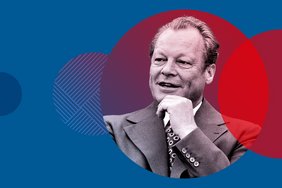During the confrontational Cold War era, Willy Brandt chose to pursue dialogue. His commitment to fostering cooperation within Europe ultimately led to the creation of the Common Foreign and Security Policy (CFSP). For his trailblazing Ostpolitik and policy of détente as well as his tenacity in the pursuit of world peace, Federal Chancellor Brandt was awarded the Nobel Peace Prize in 1971. In celebration of the 50th anniversary of the Nobel ceremony, the Friedrich Ebert Foundation in cooperation with the Federal Chancellor Willy Brandt Foundation held a panel discussion on 8 December 2021 featuring distinguished guests.The discussion was followed by an official ceremony.
IFSH Director Professor Dr Ursula Schröder and IFSH Europe expert Dr Barbara Kunz spoke with OSCE Secretary General Helga Schmid, NATO Secretary General Jens Stoltenberg and Friedrich Ebert Foundation President Martin Schulz, among others. The participants discussed the question of what Brandt’s policies can teach us about current challenges in foreign policy, peace policy and security policy.
A recording of the event can be found here.
The conversation between IFSH Europe expert Dr Barbara Kunz and Martin Schulz on Europe’s role in peace policy begins at 1:30:00.
Beginning at 5:20:00, you can watch the ceremony and panel discussion with IFSH Director Professor Dr Ursula Schröder, NATO Secretary General Jens Stoltenberg and OSCE Secretary General Helga Schmid.
What is the function of the Nobel Peace Prize? A Federal Chancellor Willy Brandt Foundation Event

On the occasion of the anniversary of the Nobel ceremony, the Willy Brandt Foundation also held an online panel discussion at the Lübeck Chamber of Trade on 9 November. The discussion dealt with the question of how relevant the Nobel Peace Prize is or continues to be, and what function and effect the prize can have. The participants included historian Elisabeth Röhrlich, Spiegel journalist Mathieu von Rohr, SPD politician and council member of the German Council on Foreign Relations Karsten Voigt, and IFSH Director Ursula Schröder. They talked about the expectations that receiving the prize entails, but also about the disappointment that results from a recipient ultimately being unable to fulfill the hopes pinned on him or her.
The public-broadcasting radio station Deutschlandfunk also used the anniversary of the Nobel ceremony and the Federal Chancellor Willy Brandt Foundation’s event as an opportunity to speak with experts about the relevance and impact of the Nobel Peace Prize. IFSH Director Ursula Schröder explained the significance of the prize in a segment for the culture- and social sciences-focussed programme “Aus Kultur und Sozialwissenschaften”.
Dr Schröder explained that while it has not been able to put an end to war, the Peace Prize is more important today that it has ever been because stopping acts of war and maintaining peace has become even more difficult. The Nobel Peace Prize remains a symbol of hope that there are processes that exist which can promote peace in the world, the IFSH director said.
You can listen to the segment “The Nobel Peace Prize today: irreplaceable yet irrelevant?” from 9 December 2021 in the Dlf media library.
The original text of Willy Brandt’s speech (in German) on the occasion of the 11 December 1971 Nobel Peace Prize award ceremony can be found here.
